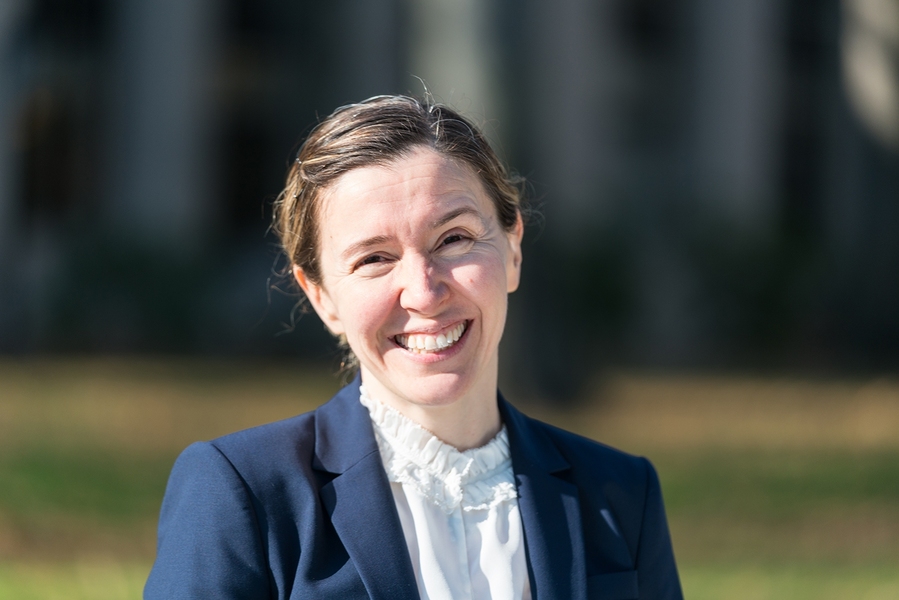Computing at MIT: A Q&A with Professor Asu Ozdaglar SM ’98, PhD ’03
-
-
Slice of MIT
Filed Under
Since the rise of ChatGPT and similar technologies has put generative AI at everyone’s fingertips, the work of MIT Schwarzman College of Computing (SCC) has become ever more relevant, both at MIT and beyond. For Asu Ozdaglar SM ’98, PhD ’03—MathWorks Professor of Electrical Engineering and Computer Science (EECS); department head of EECS; and SCC’s deputy dean of academics—these cutting-edge technologies and their implications continue to shape her work and help her shape the priorities of computing at MIT.
She is an expert in nonlinear and convex optimization, machine learning, game theory, economics, and networks. As a preview to her upcoming keynote talk at the Alumni Leadership Conference, Sept. 29–30, Ozdaglar answered a few questions related to computing at the Institute for Slice of MIT.
What is your biggest priority as EECS department head and deputy dean of academics at the Schwarzman College of Computing?
For EECS, my biggest goal is to continue the department’s international leadership in electrical engineering and computer science through innovations in research and education. We are experiencing an incredible time, with digital technology transformation impacting every aspect of our lives. The disciplines represented within EECS—computer science, artificial intelligence and decision-making, and electrical engineering—are core aspects of this transformation, and all are dynamically evolving and expanding with connections to myriad domains and applications. This necessitates continuous reoptimization of strategic priorities, which has implications both for hiring new faculty and for planning for future educational activities.
The Schwarzman College of Computing was founded to seize the opportunities presented by the computing age and expand the capabilities of academia in three dimensions: supporting rapid growth and evolution of computing fields, infusing computing education and research across different disciplines, and making social and ethical implications a forefront consideration because of the broad applicability and relevance of computing in many aspects of society. The college has launched a number of cross-cutting programs and developed new models of hiring and faculty appointments to support these objectives.
What is one example of a new program in the college, and what makes it unique?
A key milestone has been launching the Bachelor of Science in computer science, economics, and data science (Course 6-14). The major was motivated by contemporary digital platforms that combine complex human decisions with intensive computation and data processing. Examples include: online markets, crowdsourcing platforms, spectrum auctions, financial platforms, cryptocurrencies, and large-scale matching/allocation systems such as kidney exchange and public-school choice systems. The operation of these systems draws expertise from three academic disciplines: computer science, which supplies platforms and algorithms on which these technologies operate; economics, which guides design of these platforms and incentives faced by market actors; and data science, which processes and interprets that vast amount of information. This major synthesizes these three areas of expertise and, importantly, is a joint effort—housed within both the economics and EECS departments.
How are emerging technologies and things like generative AI impacting your areas of research?
Generative AI promises to provide intelligent and flexible assistance that complements human decision-making and creative tasks. As such, it has implications in many domains, including programming, management, education, and arts and sciences. It has motivated a number of core technical questions on how systems in these domains work and how their performance can be improved and made more transparent, but also many fundamental questions about how generative AI can be applied and deployed in different areas. It seems to me there is incredible excitement and activity across MIT and beyond on these questions.
These developments have also affected my own research. My research focuses on how digital technologies and humans interact, and aims to develop both algorithms and incentives for efficient communication and information exchange in these platform-mediated multiagent systems. Generative AI introduces a new host of possibilities and questions within these systems and further amplifies the need to consider technological and social and behavioral questions within the same framework.
What are students at MIT most interested in today?
Students are interested in addressing big and transformational problems that can have a real impact on society. They view computing as a broadly applicable toolset that can help them make progress on many different impactful problems. I believe this is one of the reasons why they are flocking into EECS—to make sure they have these powerful skills under their belt and can apply them to myriad different applications and career paths.
Want to attend Professor Asu Ozdaglar’s talk at the 2023 MIT Alumni Leadership Conference and enjoy a full schedule of other speakers and sessions? This is the last week to register online but alums and volunteers are welcome to register on-site.









